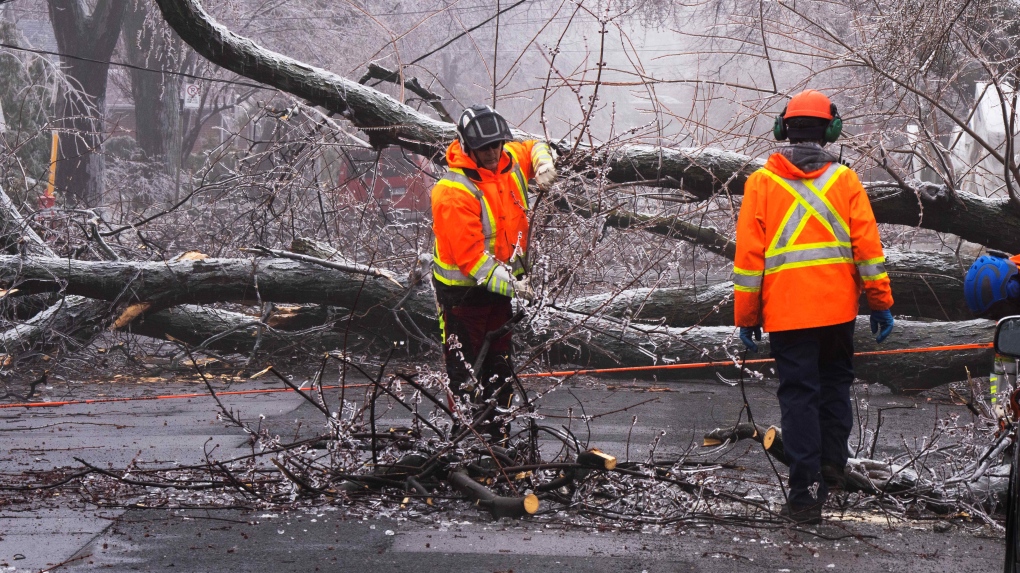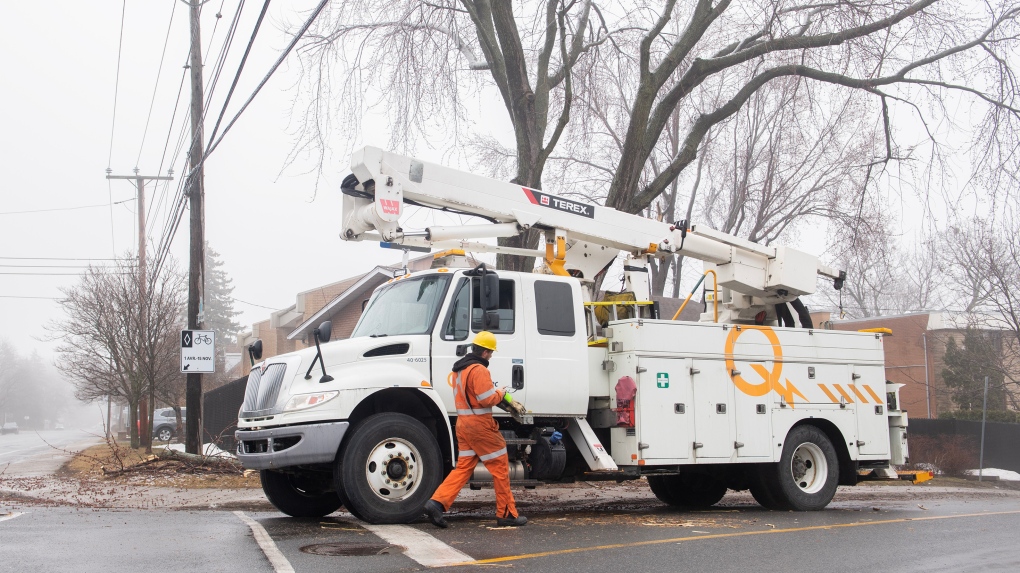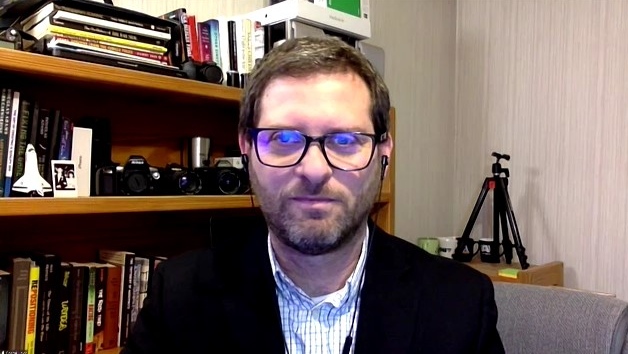'We have to be realistic': Quebec premier says burying hydro lines underground too expensive
The widespread power outages that left more than one million Hydro-Quebec customers in the dark this week during a storm once again raised questions about the reliability of the power grid.
As tree branches cracked under pressure from ice buildup during Wednesday's storm and fell onto nearby power lines, the outage has many Quebec residents wondering why the province isn't moving ahead with burying those lines underground.
The fact that the number of clients who lost electricity surpassed one million is a sign, according to one expert, of how fragile the grid is in the face of a growing number of major storms.
"Every year, you have to go and cut branches but that has to be done. In the populated areas, I think it's high time that we decide to bury the wires. It will take decades to do that but we need to start," said Normand Mousseau, scientific director of the Institut de l’énergie Trottier at Polytechnique Montréal.
"We should have started in the 1970s, but every time Hydro-Quebec says it's not the time, it's too expensive."
Mousseau, who is also a physics professor at Université de Montréal, said power outages will be more frequent and long-lasting because of climate change, and disagrees with the notion that there's not much to be done about trees falling on hydro lines.
Premier François Legault was asked why the province isn't burying the lines underground during a news conference at Hydro-Quebec's operations centre Thursday.
"We have to be realistic. Some people, they think that we can put all cables under the ground. It would cost $100 billion to do that only in Quebec," the premier responded.
"There will be new ways to ensure that we have less and less damages because, unfortunately, we have to be prepared. We'll have more and more climate impacts."
 City workers clears fallen branches Thursday, April 6, 2023 after yesterday’s ice storm which left over a million customers without power in Montreal.THE CANADIAN PRESS/Ryan Remiorz
City workers clears fallen branches Thursday, April 6, 2023 after yesterday’s ice storm which left over a million customers without power in Montreal.THE CANADIAN PRESS/Ryan Remiorz
LINES SHOULD BE BURIED DURING ROADWORK: PROFESSOR
But what Mousseau said the premier is overlooking is that outages will worsen not just because of more frequent storms, but also because the province will rely even more on the electrical grid as its moves toward its net-zero goals by 2050.
He suggested that whenever there is road work or a new development is under construction, those are perfect opportunities to put the hydro lines below the surface.
"We have to prepare and have the network align with the weather we're forecasting. Just burying the lines will take 50 years in dense populations. We better start today and make sure as we move forward, it's done. And we have to oblige every new development [to] have wires buried. This is not the obligation today in Quebec, which is amazing," he said.
 A Hydro Quebec truck is shown on a street following an ice storm in Montreal, Thursday, April 6, 2023. More than one million customers in Quebec and Ontario were without power Wednesday after a messy mix of freezing rain and thunderstorms pummeled parts of both provinces. THE CANADIAN PRESS/Graham Hughes
A Hydro Quebec truck is shown on a street following an ice storm in Montreal, Thursday, April 6, 2023. More than one million customers in Quebec and Ontario were without power Wednesday after a messy mix of freezing rain and thunderstorms pummeled parts of both provinces. THE CANADIAN PRESS/Graham Hughes
Quebecers don't have to think that far back to the last time such a widespread outage left them in the dark. The pre-Christmas storm last year cut power to more than 640,000 customers between Dec. 23 and 25 and ended up costing Hydro-Quebec more than $55 million.
Hydro crews replaced more than 500 poles and more than 530 transformers in the aftermath of the fierce, multi-day storm, which the Crown corporation characterized as a "a storm of rare intensity characterized by very high winds."
Technology analyst and journalist Carmi Levy agrees now is the time to do another cost-benefit analysis to make the network more resilient to weather-related disruptions.
"Up until now, the cost of burying all of these wires has been deemed to be too expensive for the frequency of failures that we would see over the next number of years, but certainly, thanks to climate change the frequency and severity of storms like this continues to accelerate. I think maybe we may want look at some of those numbers, review the math and ask ourselves is it worth it making that investment now?"
"Because if this keeps happening over and over and over, the cost to society is a lot more than it would be if we had simply buried them in the first place."
'MARKED DECLINE' IN THE POWER GRID
A scathing report from Quebec's auditor general last December criticized the quality of Hydro-Quebec's grid, noting a "marked decline" in the service provided to its 4.5 million customers.
"The reliability of the distribution of service has deteriorated in recent years," the report by Guylaine Leclerc concluded, adding that the outage reduction plan adopted by management in 2020 has not produced the expected results.
 Prime Minister Justin Trudeau and Mayor Valerie Plante look at the damage after yesterday’s ice storm, which left over a million customers without power, in Montreal, Thursday, April 6, 2023.THE CANADIAN PRESS/Ryan Remiorz
Prime Minister Justin Trudeau and Mayor Valerie Plante look at the damage after yesterday’s ice storm, which left over a million customers without power, in Montreal, Thursday, April 6, 2023.THE CANADIAN PRESS/Ryan Remiorz
Over the past decade, the number of power outages increased from 36,314 in 2012 to more than 42,000 in 2021. During that same period, the average duration of the outages increased by 63 per cent.
Outgoing Hydro-Quebec president and CEO Sophie Brochu said the Crown corporation has been working to increase the pace of maintenance of vegetation around the power lines, but with the labour shortage and the training these workers need it's not something that will happen overnight.
She also said when trees get weighed down with ice, and with wind added to the mix, there's not much you can do about trees falling onto lines.
The focus for her crews now is to maintain the tree growth around hydro lines to prevent power disruptions in the future.
"That's our intention and our ambition, and then you prepare for situations like this," she told reporters Thursday.
"But today, it's ice on branches. You can invest all the money in the world, your equipment will not tolerate that when they fall. And it will happen more often, that's for sure."
FRAGILE COMMUNICATION NETWORK
The ice storm has also exposed the fragility of the communication network.
On top of home Wi-Fi being unavailable during an outage, some Quebecers experienced issues with cell service.
"There are a number of environmental and electrical grid factors that can result in a cell phone tower not being available to handle traffic at this critical time," said Levy.
"Add on the fact that you have millions of Quebecers now literally hammering away at their phones and you can see that this is a recipe for disaster."
 Carmi Levy, a tech analyst, said Quebec should reconsider whether or not it's worth putting hydro lines underground to prevent further widespread power outages. (CTV News)
Carmi Levy, a tech analyst, said Quebec should reconsider whether or not it's worth putting hydro lines underground to prevent further widespread power outages. (CTV News)
Levy says there is a misconception that smartphones should always work during a power outage. Even though the devices connect to a wireless tower, every tower needs electricity.
"The cellphone towers themselves should have generators on them, but the fuel in a generator’s tank doesn’t last forever," said Levy.
"After a few hours, it will run out, so they might simply lose power or parts of them may have been damaged by falling ice or by just an accumulation of ice."
Some networks operate like an old string of Christmas lights—if one bulb goes out, the whole string goes out, he said.
To reduce bandwidth needs and keep phones charged and working longer, Levy offers the following tips:
- Use your phone’s voice-to-text feature, which transmits less data.
- Turn off apps that use large amounts of data, like games.
- Move to another location to find a better signal.
- Disable apps running in the background of your phone.
With files from CTV News Montreal's Angela Mackenzie and The Canadian Press
CTVNews.ca Top Stories

Halifax airport runway reopens after plane caught fire upon landing
The plane that caught fire upon landing at Halifax's airport over the weekend has been removed, and the runway has reopened.
Liam Payne's manager, hotel staff failed 'vulnerable' singer before death, judge says
An Argentine judge argued that the manager of singer Liam Payne and employees of the hotel where he was staying failed the popstar in the moments before his death, according to the prosecutor's office.
2024 has been a nerve-wracking year for plane travel. How safe is it really?
Anxious airline flyers may well remember 2024 as the year their worst fears about the safety of air travel felt confirmed, as a series of unprecedented, and in some cases fatal, airplane incidents captured headlines.
Father and daughter found dead in northwest Calgary
Calgary police are investigating the death of a father and daughter on Sunday night as a double homicide and believe it's the result of a domestic incident.
New Year, New You: Setting achievable resolutions with a mindful approach
Many people set New Year's resolutions but not all resolutions are created equal. Here are some tips on how to set your goals according to an expert.
Year in review: Notable people who died in 2024
Here is a roll call of some noteworthy figures who died in 2024.
Mexico to investigate a town that thanked a drug lord for holiday season gifts for children
Mexico's president said Monday that prosecutors are investigating officials in a town where a sign was posted thanking a drug lord for holiday season gifts for children.
opinion Tom Mulcair: Grading Trudeau's performance in 2024, and what's ahead for him in the new year
Prime Minister Justin Trudeau is about to enter the final year of his mandate and, quite possibly, of his political career, writes Tom Mulcair in his column for CTVNews.ca. The former NDP leader takes a snapshot of Trudeau's leadership balance sheet as a way of understanding how he got to where he is in the polls.
Murder, she spoke: Violence and death getting mentioned more often in movie scripts, study finds
A new study shows that movies have more violence in them than ever -- or at least, movie characters are more interested in talking about it.

































